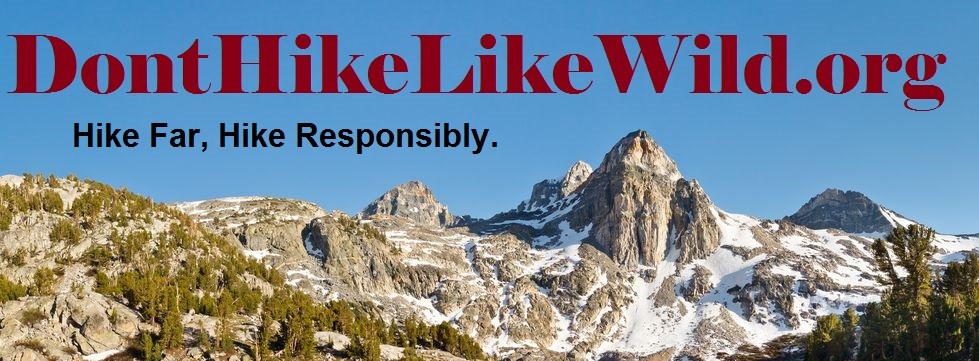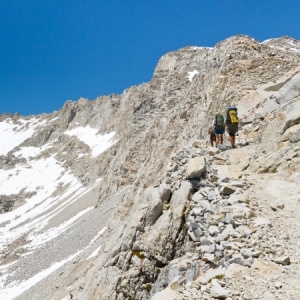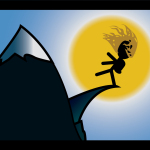The Pacific Crest Trail travels over 2600 miles from the deserts of Southern California on the Mexican border, over the Sierra Nevada Mountains, across the Cascade Range, through the forests of Oregon and Washington before reaching Canada. It is a designated National Scenic Trail and is maintained by federal and state agencies as well as scores of volunteers. Each year hundreds of hikers and equestrians set out to travel on extensive long-distance hikes across the trail. Many even attempt to hike the entire trail.
In 1995 a woman named Cheryl Strayed set out to spend her summer hiking on the PCT. She chronicled her story over a decade later in her book Wild. The book has been on the New York Times bestseller’s list for over 88 weeks now and was featured in Oprah’s book club. The story is now being released as a major motion picture, starring Reese Witherspoon. Early reviews have been glowing, and the Oscar buzz for Witherspoon and the film has already begun.
So what is it about this tale of a young woman who goes backpacking that has captured the imagination of a nation? Many are shocked that she attempted such a journey alone. Others are impressed by her bravery and fortitude to even begin such an undertaking.
Conversely, among the community of thru-hikers, people who actually hike the PCT and other long distance trails, there seems to be a sense of bemusement about the success of Wild. The general consensus among thru-hikers seems to be that Strayed’s feat is rather unimpressive, and not worthy of such literary recognition.
It’s a little hard to put your finger on exactly why thru-hikers get so fired up about trashing Wild. Was it because Strayed did not hike the entire Pacific crest Trail? Not really. Bill Bryson did not hike the entire Appalachian Trail. But he wrote a book that is at once funny, informative and insightful. One of the mantras of thru-hikers is “Hike your own hike”. If Strayed only wanted to walk 1000 miles, skipping around to the easiest sections, she was perfectly within her own right. Hike your own hike. After all, she has never attempted to portray her trip as a complete thru-hike.
Instead there is something else about Wild that rubs thru-hikers the wrong way. Perhaps it boils down to personal responsibility. Strayed admits to setting out on her PCT journey quite unprepared. As her trip progressed, she demonstrated the same irresponsible and reckless behavior that she maintained in her ‘regular’ life. Subsequently she relied on others to bail her out.
A Hard Life
Four years before she began the PCT, Strayed’s mother died unexpectedly of cancer. While most people go through a natural period of grieving after such events, Strayed allowed the tragedy to consume her life. Her previously solid marriage began to falter as she fell into a series of affairs. She followed that with more destructive behavior, taking drugs and sleeping with any man that would look her way. She traipsed around the country, working odd jobs and changing course with the wind. While such wanderlust and experimentation is common, and even accepted, for many young people, any virtue is muted when her self-destructive behavior begins to affect others. Just ask Strayed’s ex-husband.
Once on the trail, Strayed’s lack of preparation became immediately evident. This was actually her first backpacking venture of any kind. Her pack was so heavy that she could not pick it up and had to go through a series of contortions just to put it on. She describes how she had not actually practiced using any of her gear, and endures a steep learning curve when that equipment fails. In the first days, as her situation becomes desperate, Strayed hiked off the PCT seeking help from strangers for food and shelter. Meanwhile her ankle was swollen from injecting heroin into her leg the week before her trip.
Wild is characterized not by the author’s noble and brave independence, but instead by her incompetence and recklessness, and her rather pathetic sense of helplessness. The story is filled with narratives of Strayed’s bumbles in which a central theme quickly emerges: Strayed did not take responsibility for herself and her actions.
Perhaps this is ironically why Wild has touched a nerve with the American public. The story is essentially a pity-party that allows people to believe that however pathetic and hopeless their own lives are, they might someday have the chance to accomplish something great. Certainly none of us are perfect, but we all have a story to tell. Hopefully the story of Wild, rather than giving permission for our transgressions, will encourage readers to take a higher road in their own paths.
It might seem easy to give Cheryl Strayed a pass. After all, nobody is perfect. Long-distance hiking is a different animal altogether from weekend backpacking. Many experienced hikers admit to making the very same mistakes that she made when embarking on a multi-month thru-hike. To be fair to Strayed, she did gradually seem to gain competence as her hike progressed. By the end she was even helping to bail out other unprepared hikers. The difference is that Strayed did not pull herself together out of a sense of responsibility. Instead she realized that she would never make it out of southern California unless she got her act together.
Strayed seems almost proud of her helplessness. Throughout Wild she points out how, since her father was a drunk, and her mother had died, that she felt that the world owed her something. She implies that she had a right to be reckless. This kind of thinking actually highlights a common, but largely unspoken thread in our society which may be a key to the source of much crime, abuse and general despair: “I’ve had a hard life, so therefore I have permission to act outside of the values that I know to be true.”
Tantalized by the Dream
Perhaps the real question here boils down to why Wild has become so popular to begin with. What is it about Strayed’s story of self-absorbed helplessness that has captured the imagination of the book-buying and movie-going public? Perhaps her allure lies in her vulnerability. After all, we have all been there. We have all found ourselves in a situation in which we felt unprepared and inadequate. We can relate to the idea of being at our wits end, desperate enough to do something rash, like hike across the wilderness for a thousand miles. The point is that even in moments of doubt, we should not let go of our values. Better to face the challenges of uncertainty with integrity and strength, rather than thoughtlessness and helplessness.
Readers and viewers of Wild should be careful not to paint Cheryl Strayed as some noble, strong, independent woman who set off bravely into the wilderness alone on some virtuous journey of self-discovery. On the contrary, Wild conveys a sense of how desperate, pathetic and helpless Strayed was during most of her hike across the country.
Strayed did manage to display one redeeming virtue during her hike. She was after all, a model of determination. How else could she walk 1000 miles under the handicaps she put herself through? No one walks that far, with an 80 pound pack, without a good shot of resolve and willpower. In her book she talks of coming close to quitting on several occasions. Indeed, every thru-hiker in their most challenging moments entertains thoughts giving up and going home to a warm shower, a home cooked meal and a soft bed. And many of them do. Of the hundreds of hikers that set off to hike from Mexico to Canada each year, a surprising number drop out before getting even as far as Cheryl Strayed did. These moments of doubt are what separates the strong from the weak, the men from the boys, the women from the girls.
Perhaps it was because Strayed knew that if she quit, she didn’t really have anywhere to go. She had sold most of her possessions and had no home address to return to. However Strayed demonstrated an impressive amount of fortitude to overcome her mistakes and immaturity and hike over 1000 miles. Humans can achieve truly amazing feats when they make up their minds to. The lesson here might be that often the biggest obstacles we face are the ones we create ourselves.
We at DontHikeLikeWild.org have just one remaining question for Cheryl Strayed: It has been nearly 20 years since you hiked halfway across the country. Some of the best parts of the PCT are left to tackle. When are you going to get out and finish that trail?



[…] criticisms are common in the long-distance backpacking community, epitomized by the website donthikelikewild.org. People think that Cheryl set a bad example by embarking on the trail without proper preparation […]